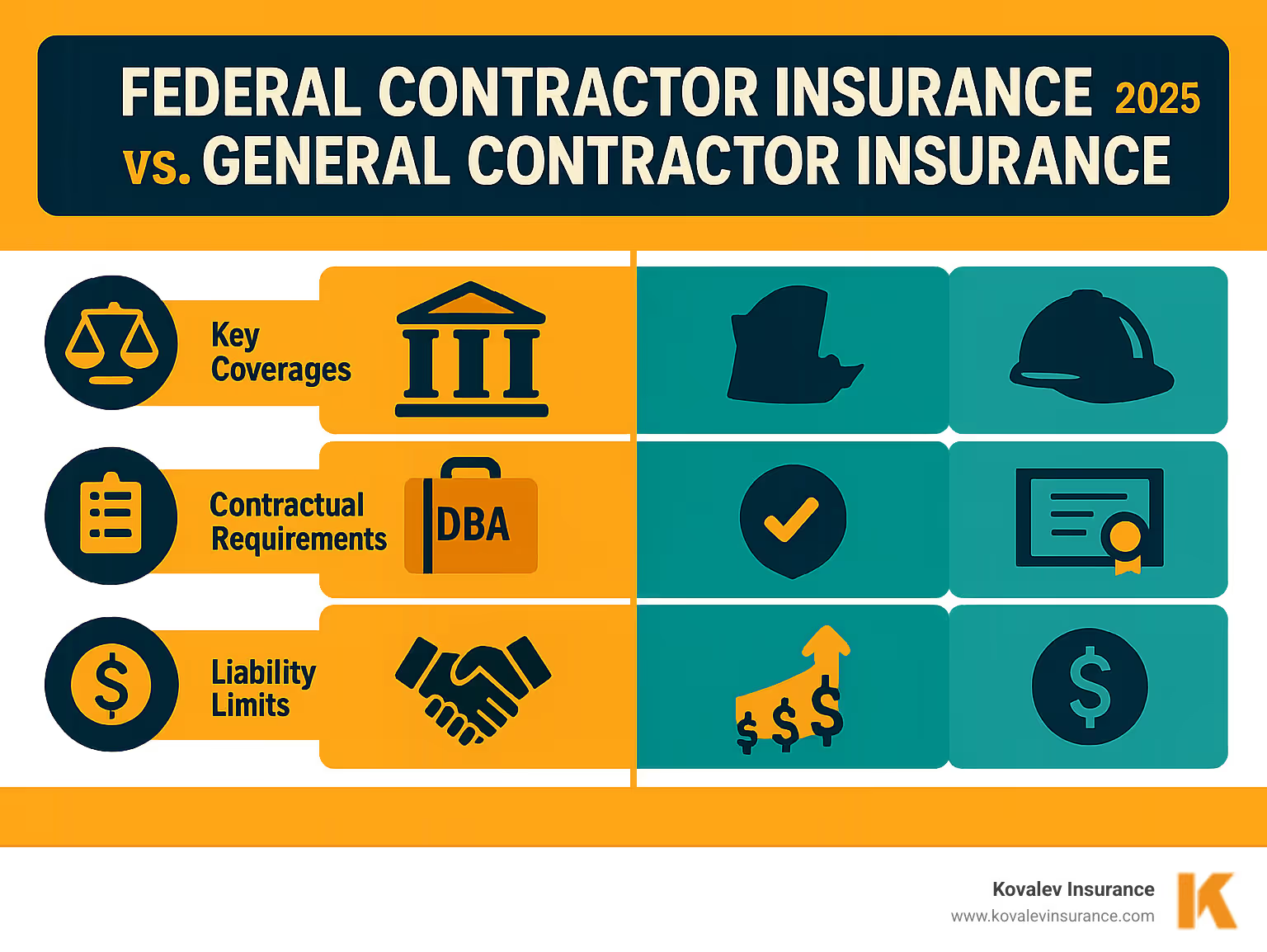Blog Content
21
Aug
2025

Insurance for federal contractors demands specialized coverage that standard business policies can't provide. If you're pursuing a piece of the $696 billion in federal contracts awarded in 2022, you must meet strict government requirements that typical commercial insurance doesn't address, leaving you exposed to compliance violations and coverage gaps.
Unlike regular commercial work, federal contracts are governed by the Federal Acquisition Regulation (FAR). This rulebook mandates specific coverage minimums, policy endorsements like a waiver of subrogation, and protections for government property. Non-compliance can lead to contract termination or disqualification from future bids.
For Massachusetts contractors in Newton, Wellesley, and Brookline, understanding these rules is the first step. The complexity grows for overseas work, where Defense Base Act coverage is mandatory.
At Kovalev Insurance, we specialize in helping Massachusetts contractors steer insurance for federal contractors. We ensure your business is protected and fully compliant with all government requirements.

Securing a federal contract means playing by a different set of rules, governed by the Federal Acquisition Regulation (FAR). These rules dictate your insurance requirements, which go far beyond standard commercial policies. A general policy for a local project in Needham simply won't cover the specific risks and liabilities of government work.
Federal contracts demand specialized coverages to protect U.S. government interests and your business. This includes robust General Liability Coverage naming the government as an additional insured, comprehensive Worker's Compensation Insurance that meets federal statutes, and often specific types of Commercial Non-Owned Auto Coverage.
Another key component is Surety Bonds. These aren't traditional insurance but financial guarantees that you will complete the project as promised and pay your suppliers, as often required by the Miller Act for construction contracts.
Understanding what's mandatory versus recommended is crucial. The FAR, particularly Subpart 28.3 - Insurance, outlines the non-negotiable requirements. Failure to meet these minimums means you can't win the contract.

Mandatory coverages and minimums typically include:
While these are the minimums, the actual risks of a project in Wellesley or Belmont may warrant higher limits. Beyond the mandatory policies, it's highly recommended to secure:
For contractors providing professional services, Professional Liability Insurance, or Errors & Omissions (E&O), is a must. It covers claims of negligence, errors, or omissions in your services, which General Liability does not.
Imagine you're an IT consultant in Brookline whose advice leads to a federal agency's system failure. E&O insurance covers the legal defense and damages from such claims. It's vital for professionals like:
E&O insurance is affordable, with policies starting around $750 annually for $1,000,000 in coverage. Most E&O policies are "claims-made," meaning they cover claims reported during the policy period. Understanding the nuances of Occurrence vs. Claims-Based Coverage is key to ensuring continuous protection. For professionals in Massachusetts, E&O is a cornerstone of responsible federal contracting.
While both federal and general contractors provide essential services, the insurance requirements they face are very different. A general contractor building a home in Newton follows Massachusetts state and local regulations. A federal contractor, on the other hand, must comply with the nationwide Federal Acquisition Regulation (FAR) and often additional agency-specific rules.
This table highlights the critical differences:

The main distinction is compliance complexity. Federal contracts often involve handling Government-Furnished Property (sometimes called Government-Furnished Equipment), which requires special endorsements. The nature of federal work—often tied to national security or critical infrastructure—introduces risks beyond typical commercial exposures. While standard policies like Construction Insurance Coverage are a foundation, they are rarely sufficient for federal contracts without significant, specialized modifications.
Working with the federal government involves unique risks that standard commercial policies don't cover. From handling classified data to working on military installations, the exposures multiply, demanding specialized insurance for federal contractors.

Consider these unique challenges:
If you do business with the U.S. government, you need specialized insurance. This applies to:
When a federal contract takes you overseas, the Defense Base Act (DBA) becomes mandatory. OCONUS (Outside the Continental United States) work triggers this federal workers' compensation program for civilian employees on U.S. military bases or under public works contracts abroad, as outlined in The Defense Base Act (42 U.S.C. 1651).
DBA coverage is critical. Without it, you are personally liable for an injured employee's medical care, rehabilitation, and lost wages, which can be financially devastating. The costs are significant, with minimum premiums often starting at $7,500. It is essential to get a DBA quote before bidding on any overseas work.
International operations may also require out-of-country medical, emergency evacuation, and sometimes kidnap and ransom (K&R) coverage. In war zones, the War Hazards Compensation Act (WHCA) can reimburse certain DBA expenses. Navigating these complexities demands an insurance partner with global expertise to protect your Massachusetts-based business anywhere in the world.
There's no one-size-fits-all price for insurance for federal contractors. Your premium is a custom quote based on your unique risk profile. Insurers weigh several key factors to determine your cost.

Key factors that influence your premium include:
For ballpark figures, Professional Liability (E&O) can start around $750 annually for $1,000,000 of coverage. However, a comprehensive suite of policies for federal work is a more substantial—yet crucial—investment.
Navigating insurance for federal contractors can be complex. Here are answers to some of the most common questions we hear from businesses in the Greater Boston area.
Yes, absolutely. The prime contractor is directly responsible to the federal government and must meet all insurance requirements in the main contract. However, prime contractors often use "flow-down provisions" to pass these requirements—and sometimes even stricter ones—to their subcontractors. A sub may need to name both the prime and the U.S. government as additional insureds and carry higher liability limits. It's critical for subcontractors in places like Brookline or Newton to have an expert review their subcontract before signing to understand these risk transfer clauses.
The short answer is no, not without significant modifications. Your standard Business Owners Insurance is not designed for the unique demands of federal work. Here's why:
Failing to secure the proper insurance for federal contractors carries severe consequences that can jeopardize your entire business. The potential fallout includes:
Federal contracting offers immense opportunities, with the government awarding nearly $696 billion in contracts in 2022. Your passport to this market is proper insurance for federal contractors. Being prepared with the right coverage is what separates successful bidders from the rest.
Meeting requirements like Workers' Compensation with $100,000 in employer's liability or General Liability at $500,000 per occurrence isn't just about checking a box; it's about fundamentally protecting your business. Even specialized coverages like the Defense Base Act for overseas work are critical investments in your team's safety and your company's stability.
Federal contracts follow predictable rules set by the FAR. Once you understand them, you can bid with confidence. At Kovalev Insurance, we help contractors across Massachusetts, from Belmont to Natick, steer these complexities. We believe proper insurance is an investment, not an expense—one that proves you are a reliable and professional partner for the U.S. government.
Don't let insurance complexities hold you back. We're here to translate confusing FAR clauses and ensure you get the right protection at the best price. Ready to take the next step? Whether you need a full federal contractor package or specialized Artisan Contractors Insurance, we're here to help. Your success in federal contracting starts with a simple conversation.
X